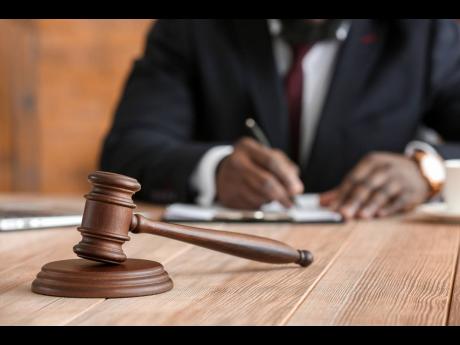Supreme Court rules unsigned police witness statements inadmissible
The Supreme Court has ruled that witness statements recorded by police investigators but not signed by them are inadmissible in court.
The ruling provides a partial legal victory for a Trelawny man who was ordered to stand trial for murder.
The decision by the Jamaican High Court, however, affirmed the long-standing practice by cops to record their own witness statements in the presence of a colleague, providing he is not below the rank of sergeant.
The ruling was handed down last Wednesday at the end of an application filed by Kenya Robinson for leave to seek judicial review of the decision by a judge in the St James Parish Court to transfer his murder case to the Circuit Court for trial.
The application was granted, but limited to the statutory requirements contained in Section 6 of the Committal Proceedings Act (CPA), Supreme Court Judge Justice Sonya Wint-Blair ordered in her decision.
A committal
proceedings hearing
Section 6, sub-section 2(a) of the CPA stipulates that a witness statement – written or electronically recorded – is admissible as evidence similar to oral evidence in a committal proceedings hearing if it is recorded by a member of the police force in the presence of either a justice of the peace or another police officer not below the rank of sergeant.
A witness statement is also admissible if it “purports” to be signed by the person giving it and the person recording it, sub-section 2 (b) stipulates. Further, sub-section 3 (a) mandates that the statement “shall” state whether it was made by a person who has attained the age of 18 years old and “shall” state the age of the person if it is made by someone under that age.
Robinson, a 35-year-old swimming instructor, was charged by the police in St James for the stabbing death of a security guard during an altercation at a club in the parish on October 3, 2022.
In November 2022, during a committal proceedings hearing in the St James Parish Court, his attorneys objected to the inclusion of the statements given by two police witnesses and a civilian witness, arguing that they were not compliant with Section 6 of the CPA.
The issues, the attorneys argued then, were that the policemen had recorded and signed their own statements and that the statement of the civilian witness was not signed by the cop who recorded it, and did not include her age.
The witness statements of the two cops were signed by a sergeant and an inspector.
At the end of the hearing, Parish Judge Sasha Ashley ruled that the statements were admissible and that prosecutors had established a prima facie case against Robinson. The case was set for trial in the St James Circuit Court.
But while awaiting his trial, Robinson, through his attorneys John Jacobs and Lemar Neale of the law firms Jacob Law and NeaLex, respectively, sought leave to challenge Ashley’s decision before the Judicial Review Court.
They also sought an order of certiorari to quash the decision of the parish judge and a declaration that a prima facie case has not been established against their client.
Neale argued, in his submissions before the Supreme Court, that by admitting the “impugned” statements of the two cops and the civilian witness, Ashley acted “outside the scope” of Section 6 of the CPA, rendering her decision to commit Robinson to stand trial for murder “ultra vires”.
“It is the applicant’s contention that though acting in a judicial capacity, the learned judge decided the matter in a manner that was procedurally irregular or … unreasonable,” Neale stated according to a transcript of the hearing.
According to him, the use of the word “shall” in the legislation means it was the intention of legislators “that the provision should be strictly obeyed”.
However, in opposing the application, Stuart Stimpson, the government attorney who represented Ashley, argued that there is no requirement in the legislation for the person giving the statement and the person recording it to be two separate persons.
Stimpson acknowledged that the statements of the two cops did not indicate their age, but said Ashley, at her discretion, could have taken judicial notice of the fact that members of the police force must be at least 18 years old.
He insisted that the parish judge properly concluded that all three witness statements satisfied the requirements of Section 6 of the CPA.
Justice Wint-Blair, in her judgment, said that the statement of the civilian witness complied with Section 6 2(a) of the CPA, but said it was in breach of sub-section 2 (b) because it was not signed by the cop who recorded it.
“The statement is signed by the maker [the civilian witness]; however, the recorder [the police investigator] has not signed it, which is a breach of Section 6(2)(b) [of the CPA],” Wint-Blair declared.
She noted, too, that the statement did not indicate that the civilian had attained the age of 14 years, but pointed out that the redacted age of the witness is stated on the first page of the statement.
“But for the failure of the recorder to sign, the statement is otherwise compliant.”
Wint-Blair also agreed with Stimpson’s submissions that there is nothing in the CPA that requires the person giving a statement and the person recording it to be two separate persons.
“I fail to see why not. The natural and ordinary meaning of the words used in the section cannot be given a meaning that linguistically they cannot bear unless the context lends itself to that interpretation.
“Nothing in Section 6 requires giving the words ‘person’ or ‘maker’ an exclusionary meaning,” she said in her judgment.

